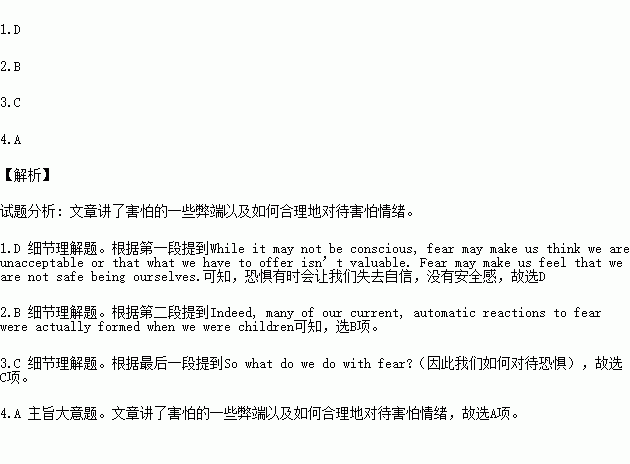题目内容
Fear can be a wonderful feeling in our lives, protecting us from dangerous situations and keeping us safe. But fear can also limit our lives significantly. While it may not be conscious, fear may make us think we are unacceptable or that what we have to offer isn’t valuable. Fear may make us feel that we are not safe being ourselves.
To avoid feeling fear, we may limit our lives greatly, living in tiny boxes. Living this way gives us the illusion(假象) of safety but leaves us with an unfulfilling life of no passion. If we shine a light on many of our fears, we see they have a very limited view of what is “safe” and how to “protect” us. Many of our fears are concerned only with protecting us from humiliation(羞辱) and failure. While these fears are doing their jobs incredibly well, they are doing so with faulty and outdated programming. Many fears we have as adults are trying to protect us as they protected us when we were children. Indeed, many of our current, automatic reactions to fear were actually formed when we were children.
Even so, it’s important not to judge ourselves for feeling these types of fears. If we judge ourselves, we will bury our fears or disguise them. By denying our fears, however, we also deny our energy, creativity and passion.
So what do we do with fear? We recognize the fear for what it is— a feeling we’ve experienced many times in the past and a feeling we will experience many times in the future. We become very familiar with our own particular brand of fears and how we allow them to control our lives. It is especially beneficial for each of us to become aware of the particular behavior patterns we’ve adopted when we feel fear, so we can look at our reactions with a sense of humor and compassion. Then, if we wish, we can choose a different response, which can be a scary yet very exciting experience.
1.According to the first paragraph, fear sometimes ________.
A. protect us when we’ve made mistakes
B. makes sure our feelings are not hurt
C. brings great change to our everyday life
D. makes us lose confidence in ourselves
2.According to the author, the ways we react to fear ________.
A. vary from person to person
B. have been formed since childhood
C. develop during our growth
D. will not change until we get old
3.The last paragraph mainly tells us ________.
A. what is the essence of fears
B. usual reactions we have when feeling fear
C. how to deal with fears reasonably
D. the importance of humor and compassion
4.What would be the best title for the passage?
A. Is fear managing your life?
B. Be calm when feeling fear
C. What do you fear most?
D. Passion, chance and fear
 智慧课堂密卷100分单元过关检测系列答案
智慧课堂密卷100分单元过关检测系列答案 单元期中期末卷系列答案
单元期中期末卷系列答案

 ),并在其下面写出该加的词。
),并在其下面写出该加的词。